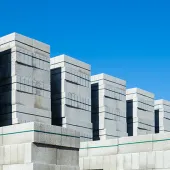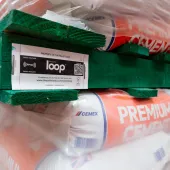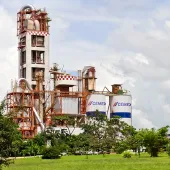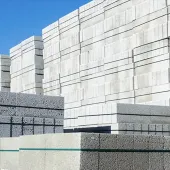Competition Commission paves way for new cement producer

Market investigation: Competition Commission issues summary of provisional decision on remedies
THE Competition Commission (CC) has today issued a summary of its provisional decision on remedies in its market investigation into the supply of aggregates, cement and ready-mixed concrete in Great Britain.
The CC is looking to invigorate competition in the Great Britain (GB) cement market by opening the way for a new independent producer.
As well as provisionally requiring Lafarge Tarmac to sell a cement plant (and accompanying ready-mixed concrete plants if necessary) to facilitate entry of this new producer, the CC is also proposing to limit the flow of information and data between cement producers.
Additionally, the CC is looking to increase competition in the supply chain for ground granulated blast-furnace slag (ggbs) by ordering the sale of suitable production facilities. This remedy is subject to further consultation on the ggbs market.
The measures are outlined in a summary of the CC’s provisional decision on remedies, marking the penultimate stage of its market investigation.
In May 2013, the CC published its provisional findings which found that both structure and conduct in the cement sector limits competition by aiding co-ordination between the three largest producers (Lafarge Tarmac, Cemex and Hanson) and is likely to be resulting in higher prices for all cement users.
In an Addendum to the provisional findings, published today for consultation, the CC also identifies competition issues in the supply chain for ggbs. The CC has not identified any problems with the markets for aggregates or ready-mixed concrete.
The CC has not, at this stage, made a final decision regarding the existence and form of any competition problems. Therefore, its final decision on any competition problems, and appropriate remedies, will take account of responses to its provisional findings (as published in May) and to the Addendum to the provisional findings (published today) and of responses to its provisional decision on remedies (also published today).
Professor Martin Cave (pictured), CC deputy chairman and chairman of the Inquiry Group, said: ‘As we indicated in May, both the scale of the problems we found in the GB cement markets and the way that they stemmed from established structure and conduct meant that extensive measures were likely to be necessary to address them.
‘The best way to disturb the balance of a market where producers have focused on retaining their respective market shares rather than competing is to create the opportunity for a major new entrant.
‘Being able to buy a cement plant – and a number of accompanying ready-mixed concrete plants if necessary – will give the new producer a foothold in the GB cement markets and will increase the number of GB cement producers, thereby disrupting the established patterns in these markets.
‘In addition to this, we will tackle the channels which facilitate the flow of information between the GB cement producers, such as price announcement letters and industry data. For a long time, these channels have given producers too much awareness of how their counterparts are performing and their future pricing strategy.
‘We think that these measures will go a long way towards establishing a more competitive market for customers. The fundamental importance of cement to the construction and building sectors, and the amount of such work that is funded by the public purse, only underlines the need for these actions.’
A summary of the remedies is as follows:
- Lafarge Tarmac should be required to choose between divesting either their Cauldon or Tunstead cement plant. The purchaser of the divested cement plant should be able to acquire a limited number of ready-mixed concrete plants from Lafarge Tarmac subject to the purchaser’s total internal cementitious requirement being capped at 15% of the acquired cement production capacity. The buyer would have to be approved by the CC and not be one of Great Britain’s existing cement producers.
- Restrictions on the publication of GB cement market data. Data currently published by the Minerals Products Association (MPA) and the Department for Business, Innovation & Skills should be delayed by no less than three months from the time period to which it refers before it can be made public. GB cement producers will also be prohibited (with a small number of specific exceptions) from providing their sales and production data to any other private sector organization.
- GB cement suppliers will be prohibited from sending generic price announcement letters to their customers. Instead, they should send letters that are specific and relevant to the customers receiving them.
- Subject to further consultation on the ggbs supply chain, Hanson should divest two of their ggbs production facilities and Lafarge Tarmac should divest two of its ground blast-furnace slag production facilities, again to a suitable purchaser approved by the CC but not to another GB cement producer.
The full provisional decision on remedies will be published shortly.
A spokesperson for Lafarge Tarmac said: ‘We’re disappointed with the Commission’s provisional decision on remedies. The Commission’s assumptions and reasoning have serious flaws and the biggest loser in this process will be the customer. There is strong evidence to demonstrate there is effective competition in the sector – with new players having recently entered the marketplace. The CC should take these factors on board for its final report.
‘The CC is yet to publish its final report and it would not be appropriate to speculate or comment further at this stage before the final outcome of this process.’
The Competition Commission is required to publish its final report by 17 January 2014 and is now inviting interested parties to respond to the provisional decision on remedies and the Addendum to the provisional findings by 29 October 2013.
To submit evidence, email: aggregates@cc.gsi.gov.uk; or write to: Inquiry Manager, Aggregates Market Investigation, Competition Commission, Victoria House, Southampton Row, London WC1B 4AD.









